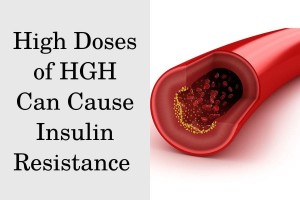In this article
Side effects of HGH therapy are commonly misunderstood. While some people tend to dismiss the risks of growth hormone altogether, others are concerned that the medication is a dangerous performance-enhancing drug that can lead to cancer and premature death.
But the best way to discover the real risks of legal HGH therapy is to rely on scientific evidence as a source of information.
Growth hormone can be potentially harmful when taken in large doses or abused as a performance-enhancing drug. Yet, HGH therapy is perfectly safe when controlled by a medical doctor who performs regular checkups and adjusts your dosage.
Keep reading to discover more about the potential risks of HGH injections and how you can avoid them in order to receive safe and effective therapy.
Side effects of HGH therapy
HGH therapy side effects may occur due to improper dosing regime or if the medication is taken at high doses that exceed the physiological ranges.

You may experience serious symptoms such as
- extreme weakness
- blurred vision
- seizures
- coma
Taking lower but nevertheless, supraphysiological doses can lead to long-term side effects such as insulin resistance and acromegaly. These side effects can be avoided by taking adequate doses of HGH injections and avoiding abuse.
Improper growth hormone dosing regime involving high starting doses can also lead to side effects. They include transitory water retention and related side effects, which occur when your body hasn’t yet adapted to the change in serum GH levels.
These side effects can be avoided by starting HGH treatment with a low initial dose and then slowly increasing it to therapeutic levels.
Water Retention
Water retention is the most common side effect, which usually occurs at the start of HGH therapy and affects about 30% of patients. The condition is transitory and preventable, and it is not dangerous.
In fact, studies show that most GHD patients are dehydrated and have a low total body water percentage. Thus, starting growth hormone therapy can quickly increase fluid retention in your body in order to restore normal hydration levels.
However, rapid water retention can lead to transitory symptoms such as edema, headache, joint stiffness, and carpal tunnel syndrome.
Edemas
The most common sign of fluid retention is developing edemas. This can make your body and face feel “puffy”. The edemas are transitory and do not pose any health risks.
Headache
The transient water retention during HGH therapy can also lead to increased intracranial pressure and headaches. The increase of intracranial pressure during HGH therapy is benign and not dangerous.
Joint Stiffness
The joint stiffness and pain during HGH therapy are caused by the increased water retention inside the joints and the swelling of the cartilage.
The condition is transitory and can be avoided completely by starting with a lower dose and then increasing it gradually.
Carpal Tunnel Syndrome
Water retention during HGH therapy can also lead to the swelling of the ligaments in your wrist, which can compress some of the nerves passing through.
If the median nerve is compressed, this leads to feelings of numbness, tingling, and weakness in the hand and arm. The condition is known as carpal tunnel syndrome, and it is transitory when caused by growth hormone treatment.
Insulin Resistance
Insulin resistance is another dose-dependent side effect of HGH therapy which occurs due to the counterregulatory actions of the growth hormone and insulin.

However, these signs are not associated with any symptoms, and insulin sensitivity returns back to normal after 3-months of HGH therapy.
Higher doses of growth hormone, which exceed the physiological norms, may lead to more significant and persisting insulin resistance, which increases the risk of developing type 2 diabetes.
Acromegaly
Acromegaly is a disorder that develops in adults due to exposure to excessive GH levels for prolonged periods. Most cases of acromegaly are due to excessive endogenous GH synthesis, usually related to a pituitary tumor.
However, long-term abuse of large doses of growth hormone can also lead to the development of symptoms typical for acromegaly. These include prominent brow bones and enlarged jaw, nose, lips, tongue, hands, and feet. The skin may become thicker and oily as well.
These signs occur because of the thickening of bone and cartilage tissue under the effects of excessive GH levels.
Unfortunately, once the signs of acromegaly occur, they are mostly irreversible. This is why it is important to avoid HGH abuse, especially over long periods.
Can HGH cause cancer?
Currently, there is no evidence suggesting there may be other long-term risks of HGH treatment, such as increasing the incidence of cancer.
In fact, a meta-analysis that covered 9 trials and more than 11 000 participants reported that the risk of cancer decreased in GHD individuals who received HGH therapy.
However, HGH therapy is contraindicated in individuals with active cancer, as there are concerns that the medication may speed up the growth and spread of the tumor or make it more resistant to treatment.
How to prevent HGH side effects
Adults with HGH prescription and purchasing only legal treatment rarely experience side effects. What is more, if there are any adverse reactions, they are always mild and transitory.

For safe and effective growth hormone treatment, your doctor will usually start you at 0.2 mg of HGH per day and then adjust your dosage by slowly adding 0.1-0.2 mg to your daily dose every 1-2 months.
In the meantime, they will monitor your symptoms and blood test results to assess the effectiveness and risk of adverse reactions. If any adverse reactions occur, your doctor will lower your dosage by 0.1-0.2 mg until your indicators return to normal.
Side effects of HGH supplements
Unlike HGH injections, you can purchase dietary supplements and homeopathic medications sold as “natural HGH boosters” without a prescription.
These products are available over the counter because they contain various dietary ingredients such as amino acids or in the case of homeopathic products – highly diluted substances that no longer contain the listed ingredients.
While such products are considered generally safe, and the most common side effects are gastrointestinal problems, they tend to lack any effectiveness, according to research.
Studies reveal that L-arginine, which is a conditionally essential amino acid and a major ingredient in HGH boosters such as SeroVital and Nugenix, does not reliably increase growth hormone synthesis in healthy individuals.
Moreover, these products cannot increase the HGH synthesis in individuals with GHD
Homeopathic products such as HGH gels also lack any effectiveness, as research reports that there is no evidence that homeopathic remedies have any therapeutic effect beyond placebo.
Unfortunately, dietary supplements and homeopathic products are exempt from most regulatory requirements, which are otherwise imposed on drugs such as HGH injections.
Therefore, there is no guarantee for the quality and safety of these products. As a result, some dietary supplements and even homeopathic products can be contaminated with toxins and heavy metals or contain substances that are not listed on the label. This can lead to various side effects and unexpected adverse reactions.
